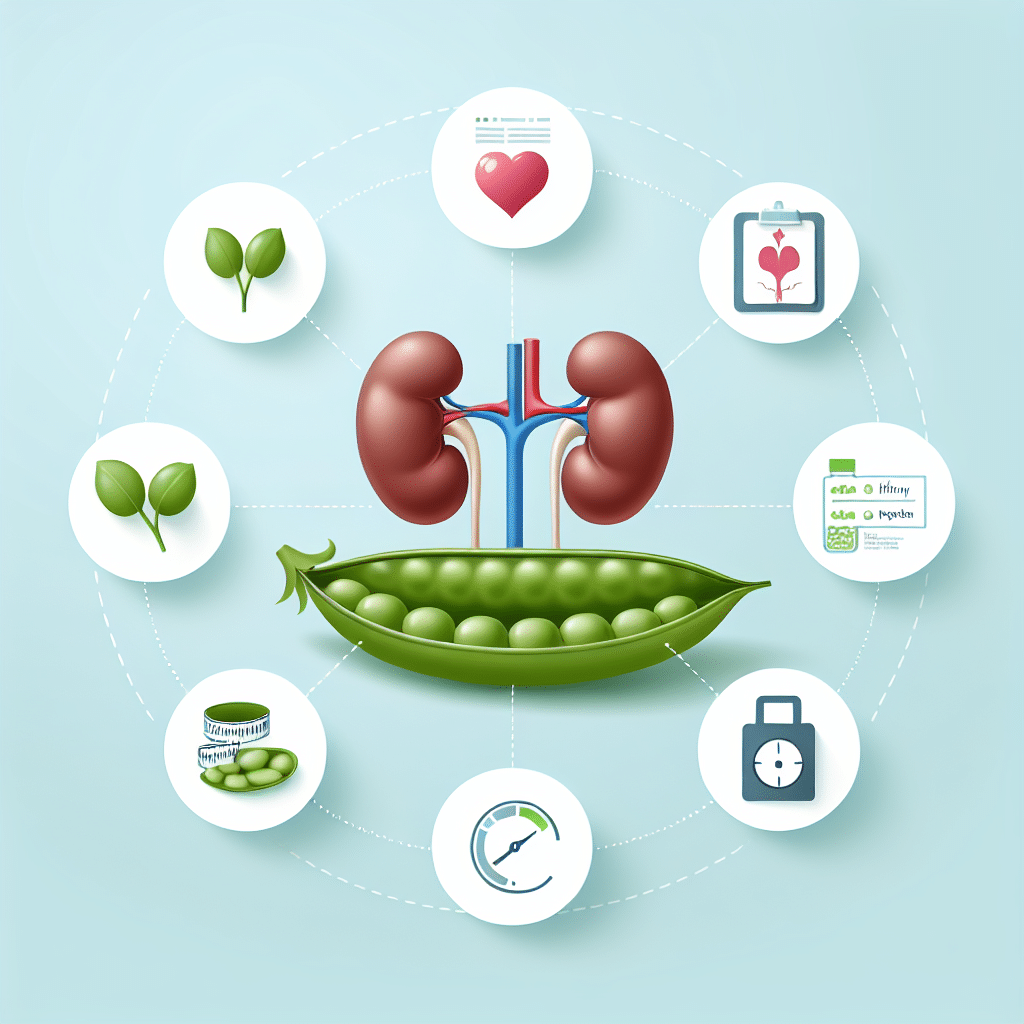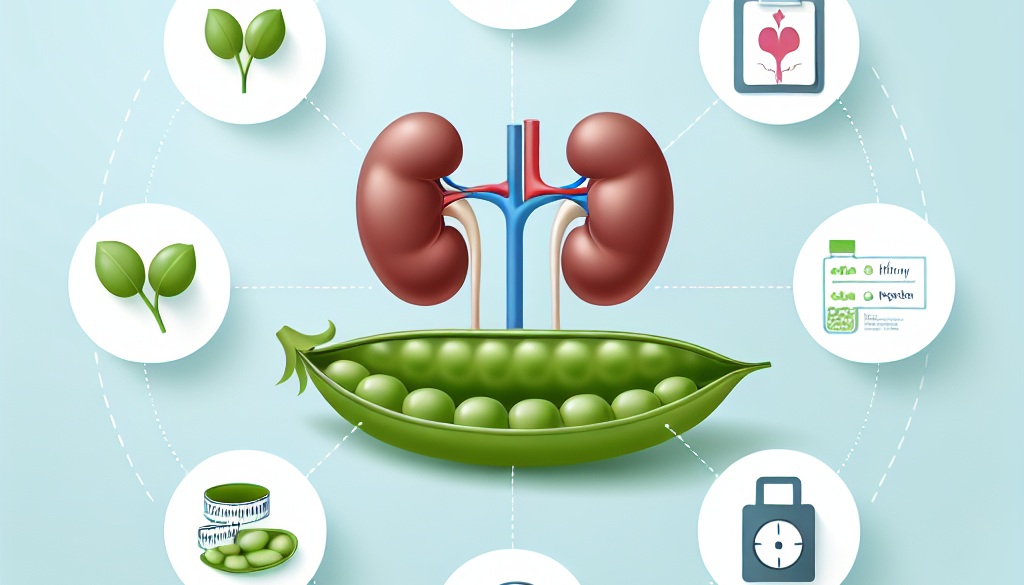Is pea protein easier on kidneys?
-
Table of Contents
- Pea Protein and Kidney Health: Is It a Safer Choice?
- Understanding Kidney Function and Protein Intake
- Pea Protein: An Overview
- Is Pea Protein Easier on the Kidneys?
- Case Studies and Research
- Practical Considerations for Including Pea Protein in Your Diet
- Conclusion: Pea Protein as a Kidney-Friendly Alternative
- Discover ETprotein’s High-Quality Pea Protein Products
Pea Protein and Kidney Health: Is It a Safer Choice?

Protein is a vital macronutrient essential for the growth, repair, and maintenance of all body tissues. However, for individuals with kidney concerns, the type of protein consumed can have significant implications for their health. Pea protein has gained popularity as a plant-based alternative to animal proteins, but is it easier on the kidneys? This article delves into the research surrounding pea protein and its effects on kidney health.
Understanding Kidney Function and Protein Intake
The kidneys are critical organs that filter waste products from the blood, regulate fluid balance, and maintain electrolyte levels. High protein diets, particularly those rich in animal protein, have been associated with increased kidney workload, potentially exacerbating kidney issues in susceptible individuals. This has led to a search for protein sources that may be gentler on the kidneys.
Pea Protein: An Overview
Pea protein is derived from yellow split peas and is a high-quality plant-based protein containing all nine essential amino acids. It is often used as a supplement by vegans, vegetarians, and those with allergies to dairy or eggs. Its low allergenic potential and sustainability make it an attractive protein source for many.
Is Pea Protein Easier on the Kidneys?
Research suggests that plant-based proteins like pea protein may have a less pronounced effect on kidney function compared to animal proteins. This is due to several factors:
- Lower in Sulfur-Containing Amino Acids: Animal proteins are higher in sulfur-containing amino acids, which can lead to an acid load that the kidneys must filter. Plant proteins, including pea protein, are generally lower in these amino acids.
- Phosphorus Content: Phosphorus, found in high amounts in animal protein, can be challenging for kidneys to process in large quantities. Pea protein contains phosphorus bound to phytate, which is less bioavailable and thus less taxing on the kidneys.
- Glomerular Filtration Rate (GFR): Some studies indicate that plant-based proteins may help maintain a stable GFR, a measure of kidney function, especially in individuals with existing kidney conditions.
However, it is essential to note that while pea protein may be easier on the kidneys, those with kidney disease should always consult with a healthcare professional before making dietary changes.
Case Studies and Research
Several studies have explored the impact of protein source on kidney health:
- A study published in the American Journal of Kidney Diseases found that high intake of plant protein was associated with a lower risk of kidney function decline.
- Research in the Clinical Journal of the American Society of Nephrology suggested that replacing some animal protein with plant protein could reduce the risk of chronic kidney disease progression.
- A study in the Journal of Renal Nutrition indicated that diets higher in plant protein and lower in animal protein might be beneficial for those with kidney disease.
These studies support the idea that pea protein, as a plant-based protein, could be a more kidney-friendly option.
Practical Considerations for Including Pea Protein in Your Diet
For those looking to incorporate pea protein into their diet, here are some practical tips:
- Choose high-quality pea protein powders or supplements that are free from additives and sweeteners.
- Incorporate pea protein into smoothies, baked goods, or as a meat substitute in recipes.
- Balance pea protein intake with other plant-based proteins such as lentils, chickpeas, and quinoa to ensure a varied amino acid profile.
Remember, moderation is key, and it’s essential to maintain a balanced diet for overall health.
Conclusion: Pea Protein as a Kidney-Friendly Alternative
In conclusion, pea protein appears to be a promising alternative for those seeking a kidney-friendly protein source. Its lower levels of sulfur-containing amino acids, less bioavailable phosphorus, and potential to maintain stable GFR make it an attractive option for individuals with kidney concerns. However, it is crucial for anyone with kidney disease to consult with a healthcare provider before making dietary changes.
The key takeaways from this article are:
- Pea protein is a high-quality plant-based protein that may be easier on the kidneys compared to animal proteins.
- Research supports the potential benefits of plant proteins in maintaining kidney health and preventing disease progression.
- Individuals with kidney concerns should seek professional medical advice before altering their protein intake.
Discover ETprotein’s High-Quality Pea Protein Products
If you’re interested in exploring pea protein options, ETprotein offers a range of high-quality protein products that could be an excellent addition to your diet. Their pea protein is characterized by a neutral taste, non-GMO, and allergen-free attributes, making it suitable for various dietary needs.
ETprotein’s commitment to quality ensures that their pea protein is an ideal choice for those looking to support their kidney health through a plant-based diet. To learn more about their offerings or to sample their products, reach out to ETprotein and discover how their pea protein can fit into your health regimen.
About ETprotein:
ETprotein, a reputable protein and L-(+)-Ergothioneine (EGT) Chinese factory manufacturer and supplier, is renowned for producing, stocking, exporting, and delivering the highest quality organic bulk vegan proteins and L-(+)-Ergothioneine. They include Organic rice protein, clear rice protein, pea protein, clear pea protein, watermelon seed protein, pumpkin seed protein, sunflower seed protein, mung bean protein, peanut protein, and L-(+)-Ergothioneine EGT Pharmaceutical grade, L-(+)-Ergothioneine EGT food grade, L-(+)-Ergothioneine EGT cosmetic grade, L-(+)-Ergothioneine EGT reference grade and L-(+)-Ergothioneine EGT standard. Their offerings, characterized by a neutral taste, non-GMO, allergen-free attributes, with L-(+)-Ergothioneine purity over 98%, 99%, cater to a diverse range of industries. They serve nutraceutical, pharmaceutical, cosmeceutical, veterinary, as well as food and beverage finished product distributors, traders, and manufacturers across Europe, USA, Canada, Australia, Thailand, Japan, Korea, Brazil, and Chile, among others.
ETprotein specialization includes exporting and delivering tailor-made protein powder and finished nutritional supplements. Their extensive product range covers sectors like Food and Beverage, Sports Nutrition, Weight Management, Dietary Supplements, Health and Wellness Products, and Infant Formula, ensuring comprehensive solutions to meet all your protein needs.
As a trusted company by leading global food and beverage brands and Fortune 500 companies, ETprotein reinforces China’s reputation in the global arena. For more information or to sample their products, please contact them and email sales(at)ETprotein.com today.














